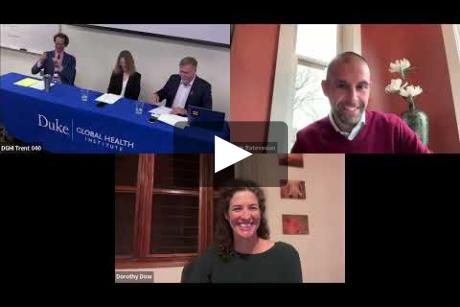
Country Roads: Looking down one of the central routes through Mwika Uuwo, you can see the ubiquitous staple banana and coffee crops. (Photograph courtesy of Rachael Clark)
Published June 22, 2013, last updated on October 5, 2017 under Voices of DGHI
By: Chandra Swanson
This blog post is from the week of June 10th - 15th. My apologies for the tardiness – we experienced some internet and technical difficulties in uploading the post.
Living on the lower slopes of Mount Kilimanjaro, the three of us have decided we should attempt at least a day hike up the mountain. To this end, we made a pact to get in proper shape. This week marks the beginning of our household interviews, and I’m coming to the realization that in fulfilling our daily interview quotas, we’ve also been fulfilling our hiking practice. A day of surveying looks a bit like this:
- Pack your backpack with 4 kilos of sugar and around half ream of paper
- Hike out to the main road, rush to the District Office, as we’re often running late
- Meet up with our perpetually cheerful and very spry guide, who introduced us to the Kiswahili word “haraka”, or quickly
- Maintain a brisk pace as you navigate banana tree roots, steep uphills, and mossy downhills
- Bonus points if: you run out of sugar and have to trek back to the nearest store, or if you have to return all the way home to retrieve the properly formatted documents, a jump drive, etc…
In all honesty though, about 40 minutes of sitting quietly punctuates each spurt of activity, not to mention the natural beauty of the banana and coffee groves that easily distracts one from the difficult terrain. Exploring the Mwika community beyond our house-dispensary-church route has also opened my eyes to more accurate realities of everyday life. For instance, several of the houses have no piped water, but in our travels, we had never come across a clear stream. Suddenly, my bucket showers seem quite the luxury. Such disparities are not uncommon, even within such a small area. We began one day at a brightly painted, television-equipped house, then walk-slid down into the next clearing to enter a squat home brightened only by the colorful newspaper clippings papering its mud-brick walls. Though it is too early to tell, it will be interesting to see if the socioeconomic disparities have any effect on health knowledge or attitudes.
In addition to the physical “challenges”, I found conducting my first interview was surprisingly nerve-racking. Though my Swahili vocabulary has finally progressed beyond a simple good morning, with all of the technical medical terms and unpredictable answers, it is like stepping on stage with only half my lines memorized – and I’ve never been good at improvisation. Luckily, we have two wonderful translators to lead us, as well as the good cheer and endless patience of our interviewees to smooth the way. Gone are the slow days and the down time, but I’m all the happier for it.


